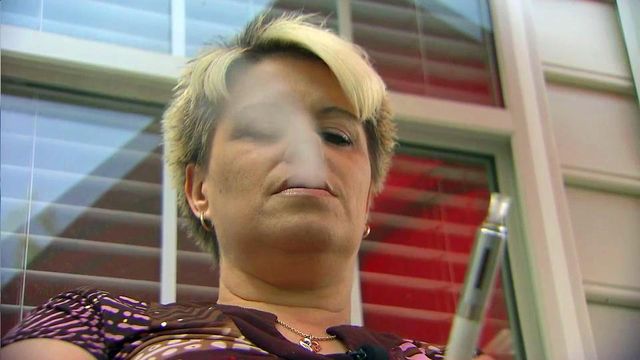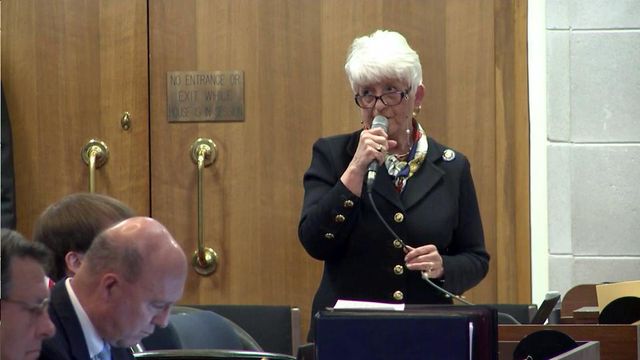House tentatively OKs tax changes, including e-cig levy
The House on Tuesday gave key approval to a package of tax changes, despite impassioned pleas to consider a proposed excise tax on e-cigarettes separately and to give cities relief from a plan to cap the privilege license taxes they charge businesses.
Posted — UpdatedLawmakers voted 83-35 in favor of House Bill 1050 on second reading. A final vote is expected Wednesday before the bill heads to the Senate.
The bill steamed through the chamber in less than a week after it came out of the Joint Revenue Laws Study Committee. Rep. Becky Carney, D-Mecklenburg, said lawmakers were allowing enough time to consider the fiscal, policy and public health impacts of taxing e-cigarettes, and she asked that the provision be pulled out of the bill for further study.
"This is a huge step we're about to take in North Carolina, and I do think that it merits debate as a standalone bill," Carney said.
Under the bill, e-cigarettes would be taxed at 5 cents per milliliter of the nicotine-containing liquid used in the so-called vapor devices. Carney noted that cigarettes are taxed at 45 cents per pack, so the state would lose money as smokers switch to e-cigarettes.
"Yeah, a nickel is great for industry, of course - that's low. But what about those revenues in North Carolina that we potentially will lose and this could bring in?" Carney asked. "if you’re gonna raise your hand on a tax, make it count."
She also pointed out that a law passed last year to prohibit the sale of e-cigarettes to minors classified them as tobacco products, while the tax bill defines them as non-tobacco products.
She suggested that the state wait for the U.S. Food and Drug Administration to rule on how e-cigarettes will be regulated, a stance echoed by Rep. Rick Glazier, D-Cumberland.
"What we know is a whole lot less than what we don't know," Glazier said, adding the lawmakers were guilty of a "rush judgment" in approving the proposed excise tax, which has the backing of the tobacco industry.
Republicans said, however, that the state needs to start collecting some tax on e-cigarettes aside from sales tax, and the rate can be raised later if needed.
"This is a place to start, and I think it’s good enough. I think we’ve kicked the tobacco industry around enough, and maybe we owe them a little deference," said Rep. Larry Pittman, R-Cabarrus.
"If we do absolutely nothing, then it's zero," Rep. Ruth Samuelson, R-Mecklenburg, said of the excise tax revenue the state will see. "We need some sort of recognition that these are a different product."
Rep. Julia Howard, R-Davie, said the state also stands to benefit as the e-cigarette industry grows. An announcement is expected in the next week of 300 new jobs in North Carolina from e-cigarette production, she said.
Rep. Jim Fulghum, R-Wake, is a physician who said he was initially concerned by the proposed e-cigarette tax. But he pushed through an amendment that reclassifies the devices as tobacco products.
"It ain't perfect, but it sure beats smoking cigarettes," Fulghum said. "There's some danger here, but there's a lot more danger in not doing anything."
Glazier was able to amend the bill so that North Carolina regulations will conform to anything adopted later by the FDA.
Aside from e-cigarettes, a proposed cap of privilege licenses was the only other provision in the lengthy bill to receive debate in the House Tuesday.
Cities assess privilege license taxes differently, from number of employees to square footage of operations to gross revenues, and Howard said merchants have complained about it for years. The bill would set a flat $100 tax per business, effective in 2015.
Rep. Paul Luebke, D-Durham, said cities stand to lose $14 million to $25 million because of the change, and he called on lawmakers to devise some strategy to help them recoup that money.
"There will be an impact of $2.2 million for Durham alone. Durham should not have to take that kind of hit," Luebke protested. "It's simply unfair to our cities that we don't hold them harmless when making this change."
Howard, chairwoman of the House Finance Committee, said the North Carolina League of Municipalities never responded to requests to negotiate a solution to the privilege license issue until Tuesday afternoon. She said she hasn't yet reviewed their suggestions.
City and county leaders say the loss of revenue could force them to either raise property taxes or cut services. Charlotte would lose more than $16 million a year. Wilmington would lose nearly $3 million.
Rep. Bill Brawley, R-Mecklenburg, denied that the impact would be so severe.
"It does not require the loss of a single firefighter, a single policeman, a single ambulance. This is a manageable situation for a fiscally prudent city council," Brawley said, pledging to continue to work on the privilege tax provision as the measure moves through the Senate.
Related Topics
• Credits
Copyright 2024 by Capitol Broadcasting Company. All rights reserved. This material may not be published, broadcast, rewritten or redistributed.






